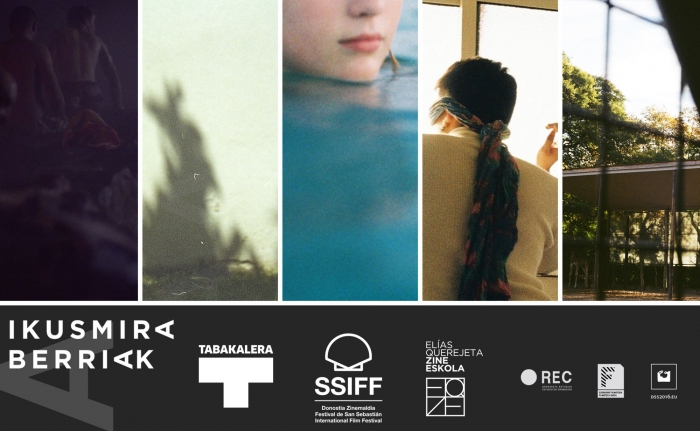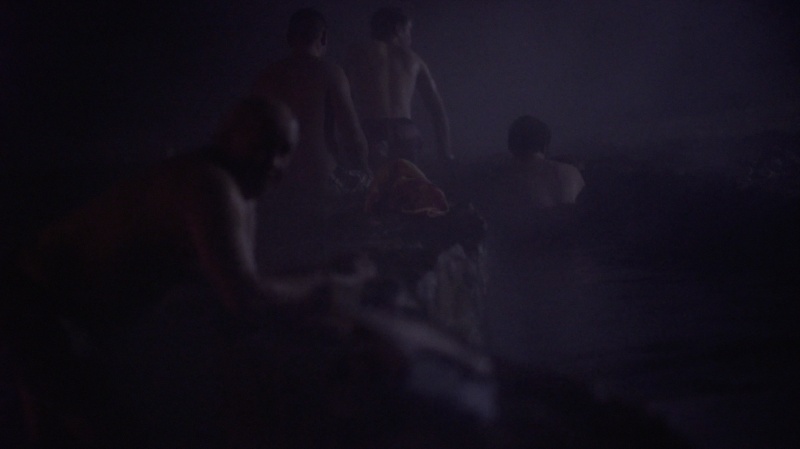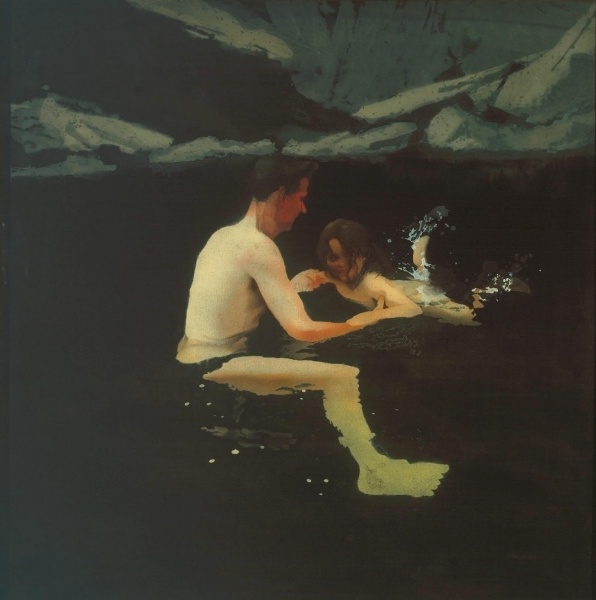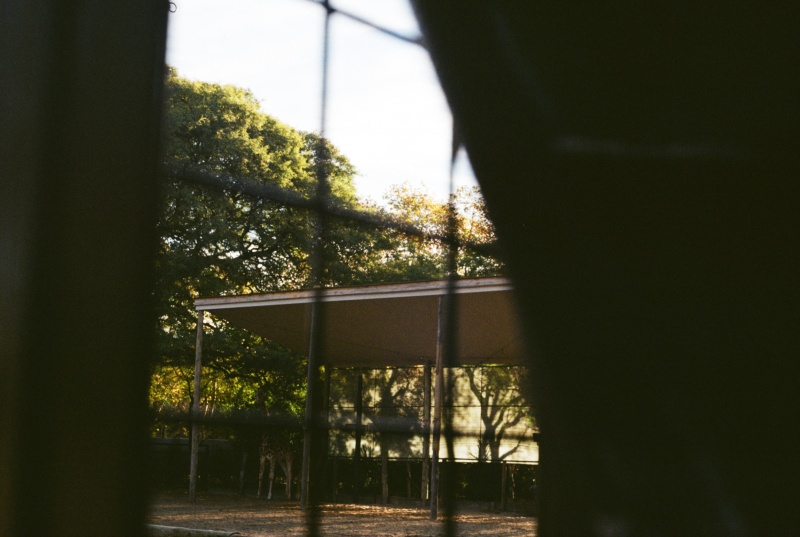Five projects from Argentina, Chile, Spain and UK have been chosen from among the 185 proposals received (6% more than last year and 478% more than the first edition) for the residency and audiovisual project development programme Ikusmira Berriak, organised by the San Sebastian Film Festival, Tabakalera - International Centre for Contemporary Culture and Elías Querejeta Zine Eskola (EQZE).
The selection committee, comprised by five members of Tabakalera - International Centre for Contemporary Culture, the San Sebastian Film Festival and Elías Querejeta Zine Eskola, have chosen the projects by Gabriel Azorín (in the new category of EQZE), Jaoine Camborda (among the works from the Basque Autonomous Community), Diego Céspedes (among the participants of the last five editions of Nest film Students), Elena Martín Gimeno (Spain) and Jessica Sarah Rinland (International).
Gabriel Azorín, from the first generation of Elías Querejeta Zine Eskola, who is a member of the "lacasinegra" collective, has presented his short and medium-length films at festivals such as Belfort, Sevilla or San Sebastian. Diego Céspedes has received awards at Locarno, Cannes and San Sebastian and will develop his first feature-length film project at Ikusmira Berriak. As for filmmaker and actor Elena Martín Gimeno -director of Júlia Ist (Made in Spain 2018), of two episodes of the series Vida perfecta (Perfect Life, Velodrome 2019) and Suc de Síndria short film, and lead actor in Las amigas de Ágata- she will work on the screenplay of her second feature-length film. Jaione Camborda will also take on the project of her second feature-length film as the director after Arima, which won awards in Sevilla and Gijón, like Jessica Sarah Rinland, who received a special mention in the Moving Ahead section at Locarno for Those That, at a Distance, Resemble Another.
For the first time, the residency will last eight weeks - two more than the last edition. The five filmmakers will arrive in Tabakalera on 2 March, where they will have time to develop their projects until 12 April.
In September, coinciding with the celebration of the Festival, the filmmakers will return to San Sebastian to complete the last two weeks of the residency, with the project more developed to share it with the film industry. During this phase they will be prepared for the pitching session, with the aim of holding meetings with professionals from the industry present at the Festival (more than 1,700 at the last edition).
Each project will receive development aid amounting to 5,000 euros that will be delivered in May, halfway between the two residency stays, so that the filmmakers can make the most of the experience.
Previous editions of Ikusmira Berriak
Of the projects from the fifth edition of Ikusmira Berriak, and after a residency, Sem dor / Painless (Michael Wahrmann), which won the REC Grabaketa Estudioa prize for post-production, has participated in the TorinoFilmLab; Un personaje volador (A Flying Character, Martina Juncadella) in the Lizières residency in France and selected in Hubert Bals Fund at Rotterdam Film Festival, after winning the ArteKino International Award from the development and co-production platform Bacifi (Buenos Aires); and All Dirt Roads Taste of Salt (Raven Jackson), at the IFP Week’s Project Forum in New York. As for titles from previous years, other recipients of awards and selections at international labs are El agua (Water), by Elena López Riera; Pornomelancolía (previously El oasis), by Manuel Abramovich, and Dormen os peixes de olhos abertos (Do Fish Sleep with their Eyes Open?), by Nele Wohlatz.
Arantza Santesteban has completed 80% of the filming of 918 gau (918 nights) and is in the first editing stage; Chupacabra (Grigory Kolomitsev) is in post-production; Eles transportan a morte (Samuel M. Delgado and Helena Girón), in the editing phase; phase which has already been completed for Fantasía (Aitor Merino), both aiming to première in 2020. The ast six months have seen the première of Muga deitzen da pausoa (Stepping into the Boundary, Zinemira 2019), by Maider Oleaga, premièred at the Gijón Festival, Trote (Trot, Xacio Baño), presented at Locarno and selected at Zabaltegi-Tabakalera and Las letras de Jordi (Jordi's Letters, Maider Fernández Iriarte) premièred within New Directors at the San Sebastian Festival.
Ikusmira Berriak is a support programme for audiovisual porojects organised by Tabakalera, the San Sebastian Film Festival and Elías Querejeta Zine Eskola in collaboration with REC Grabaketa Estudioa and the Basque Film Archive, and is part of the legacy of San Sebastian 2016 European Capital of Culture.

Arousa Island, August 1971. The apparent normality of the island hints at the secrets of its inhabitants, whispered truths that cannot be revealed. María, a corpulent woman of some 40 years of age, helps women to deliver babies, accompanying every contraction, every effort and birth with her own sweat and body. Sometimes, in the silence of the night, she performs clandestine abortions. One morning María is accused of a young girl’s death and has to flee from the island. María sets out on an overland escape route with the idea of crossing the border by one of the contraband routes running between Galicia and Portugal.
After completing her film studies at the Film School of Prague (FAMU) and the Munich Film School (HFF), she moved to Galicia where she founded the Esnatu Zinema production company, with which she has produced renowned work as the director of films made with experimental material such as Proba de Axilidade, Nimbos, Lilit or Rapa das Bestas. Her themes tend to include an ethnographic perspective that reflects on the relationship of man with animals, violence and atavism. She is directing the feature-length Arima (Award to the Cinematographic Direction in the New Waves Seville European Film Festival) in addition to collaborating as a scriptwriter and art director in many films.
"This film does not intend to be a historical document. I rather resort to the past to find an echo with the present that can help us find keys to confront the present. A very physical film that will explore themes such as maternity and borders in a context of prohibition and clandestinity".

1984. Lidia, an intrepid 12 year-old girl, lives in an isolated mining village affected by an unknown illness that has already killed several men and, according to rumours, is transmitted when a man falls in love with another by looking into each other's eyes. Her beloved brother Alexo, an obese homosexual, is found guilty of carrying the disease and the townspeople decide to tie him up and keep watch over him. This pushes Lidia to confront the ignorance of a myth and put the relationship with her family to the test.
Chilean filmmaker. He studied film and television at the University of Chile. He has worked as director of photography and montage editor for different short films, among which is Non Castus, which received a special mention at the Locarno Festival. In 2018 he wrote and directed his first short film, The Summer of the Electric Lion, which won the first prize of the Cinéfondation at the Cannes Festival, the NEST Panavision award at the San Sebastián Film Festival, and was selected at a variety of festivals such as Sundance or Palm Springs. He is now working on his first feature-length film, The Mysterious Gaze of the Flamingo.
"The film seeks to portray the relationship between Lidia and Alexo, who are siblings but behave like a mother and daughter. Through everyday details, endless rumours and an adolescent perspective, we are immersed in an exploratory journey in which Lidia confronts the ignorance of a village that tries to bury the reality of HIV-Aids and homosexual relationships under a hilarious myth".

A few Portuguese boys cross the border to bathe in the hot springs of ancient Roman baths. There, they meet several groups who have come here to spend the afternoon. Some are looking for rest, others for fun; each one enjoys the water in their own way. As night falls, one of the Portuguese boys confesses something to his friend that has been going round in his mind for some time. When they leave, the only thing left is the water and the starry sky. But another group of young boys are also looking at that sky. They are the Roman soldiers who built the hot springs. And their age and concerns are not very different from those of the Portuguese boys.
Gabriel Azorín. Diploma in cinema by ECAM. He is part of the first promotion of the EQZE. He directed the short films Los galgos and Mañana vendrá la bala and the medium-length film Los mutantes. His works have been shown in festivals such as Entrevues de Belfort, Festival de San Sebastián, Festival de Cine Europeo de Sevilla, Ficunam, Zinebi, Márgenes or Porto/Post/Doc. Azorín forms part of "lacasinegra" collective, with which he has developed various projects that relate cine- ma with contemporary forms of audiovisual production and distribution. "lacasinegra" has collaborated with cultural centres such as Tabakalera, IVAM and CCCB.
"With Last night I conquered the city of Thebes I seek to create a state of suspension in which we feel that all times coexist in the same place. In this way we draw a line that connects the Portuguese boys at the beginning with the Roman soldiers at the end. Both groups share age and concerns. And, although the film takes place in just a few hours of a winter Saturday, we will have traveled 2000 years back in time."

Mil·la (4) spends her summers at the beach. Her father, her favourite person, shows her the world tenderly, while her mother occupies a discreet and resigned back seat. The energy burgeoning from the young girl transforms the connection with her surroundings, her body and the sea. But the adults feel uncomfortable with her freedom. Mil·la (15), shy and self-conscious, discovers seduction as an arm of subjugation. In her search for the limits, something breaks between the girl and her father. Mil·la (30), respected, masculine, is suffering a profound personal crisis. Only by reconciling with her lineage will she succeed in making peace with her body and returning to the sea.
Straddling the world of cinema, theatre, acting and directing, her debut as a director was Júlia ist (Biznaga Plata Best Director, Best Film, Movistar+ Best Film at Malaga IFF). She directed two episodes of Perfect Life by Leticia Dolera (Best Performance, Best Series at Cannes Series). As an actress, she starred in the short film Suc de Síndria (EFA-nominated: Best Short), Con el viento and Agata’s Friends. As a performing artist she has co-founded the creative lab Elsmalnascuts and the VVAA collective. Elena is currently writing Veneno, a series by Los Javis for Atresmedia, and about to premiere with the play This is Real Love (Teatre Lliure).
"I want to talk about the consequences of the normalisation of female sexual repression. So, I decided to enter the world of taboos that is infant female sexuality, the origin of this unconscious repression. Starting from a fear of rejection in her present, I want to guide a thirty-year-old woman towards the purest form of pain: disgust and shame, both emotions related to repression and abuse, for her to reconnect with her desire. I want to analyse and break down the relationship between sex and danger and question the use of repression in Christian education".

A zookeeper and gardener who have both worked at the local zoo for many years have only seen each other in passing. After bumping into each other at a New Year's Eve bonfire, their friendship begins. Collective Monologue follows them working at the zoo as they engage in long conversations, sharing stories and knowledge about architecture, animals, the future of the zoo, family and history. What starts with active listening and long conversations develops into camaraderie and action.
Argentine-British artist filmmaker, Jessica Sarah Rinland has exhibited work internationally including Toronto Film Festival, New York Film Festival, BFI London Film Festival, Rotterdam, Oberhausen, Edinburgh International Film Festival, Bloomberg New Contemporaries and Somerset House. She has won awards including Special Mention at Locarno Film Festival for her first Feature Film, Primer Premio at Bienale de Imagen en Movimiento, Arts + Science Award at Ann Arbor Film Fetisval, ICA’s Best Experimental Film at LSFF, and M.I.T’s Schnitzer prize for excellence in the arts. In 2017/8 she was a Film Studies Center Fellow at Harvard University and is currently an Associate Artist at Somerset House Studios.
"In 1936 psychologist Jean Piaget coined the term “Collective Monologue”: a period of egocentrism in a child’s life where they see the point of view of the listener as irrelevant. They believe that nature is created for them, and that they can control it".










